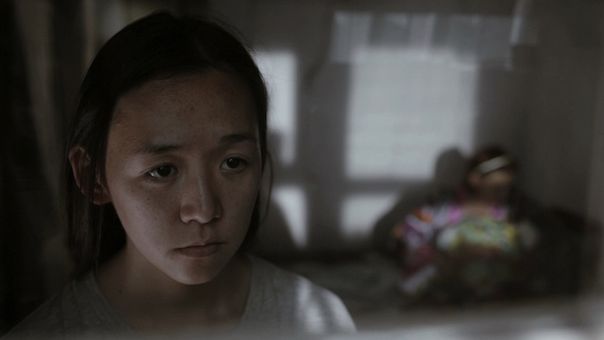No Woman, No Cry
Karla Lončar of the 2014 Talent Press reviews the Kazakh drama NAGIMA, which features in the Berlinale Forum.

Zhanna Issabayeva's NAGIMA
NAGIMA, the latest film by the acclaimed Kazakh director Zhanna Issabayeva, takes a bleak view of the situation faced by single working-class women in patriarchal Kazakhstan. The film in Berlinale Forum introduces us to the central character, Nagima (Dina Tukubayeva), a restrained 18-year-old orphan who works as a kitchen porter and takes care of her pregnant friend Anya (Mariya Nezhentseva). They live in a ruinous house next door to a prostitute, Ninka (Galina Pyanova), and barely make ends meet. When Anya dies during childbirth, leaving her baby girl behind, Nagima is faced with a shattering loneliness she hadn’t experienced before.
Tukubayeva’s arresting performance contributes to the film’s gloomy quality. Often surrounded by silence and without much expression, she communicates with the audience nonverbally, giving the impression of a ghostlike figure whom life has passed by. Cinematographer Sayat Zhangazinov accentuates Nagima’s aloneness by placing her in the midst of vast, spare spaces. Nagima’s desolation also comes to the fore with most of the people around her, as her quiet appearance contrasts with their harsh and aggressive demeanor.
Issabayeva depicts Kazakh society as a crude, unloving place where men hold the keys to the cash-desk and make most of the important decisions; meanwhile, the upper-class women obey men’s rules without offering empathy to the deprived. The marginalized women suffer the most. The society’s harshness leaves its mark almost literally on their bodies. Nagima, with her bony frame and patchy skin, appears to be on the verge of starvation. Anya dies as a result of her difficult pregnancy, and Ninka makes her living by selling her body to strangers. If you are a woman without a family, a husband and a respectable job, you are destined to remain at the bottom of society – a fate that awaits Anya’s child, as well.
These characters are filled with sociopolitical meaning; the downside is that they do not significantly evolve throughout the film. Their conversations aren’t entirely convincing, mostly reflecting standardized notions commonly seen in thematically similar films. When Anya cries, "What’s wrong with us?" or "Are we worse than other people?" she tells viewers what they need to know about the social position of these women, but those questions don’t tell us who these women really are. However, one conversation really stands out, offering a more definite glimpse into Nagima’s desires – at one point, she asks an acquaintance from a local shop to lie to her by telling her, convincingly, that he loves her.
Although Issabayeva fails to bring significant depth to her characters, she manages to present the horrors and irrelevance of this deprived group of women. By making their desperation palpable, she pinpoints the flaws of the society in which they live and asks the audience the same question Anya does: Is something really wrong with them, and are they really worse than other people?

